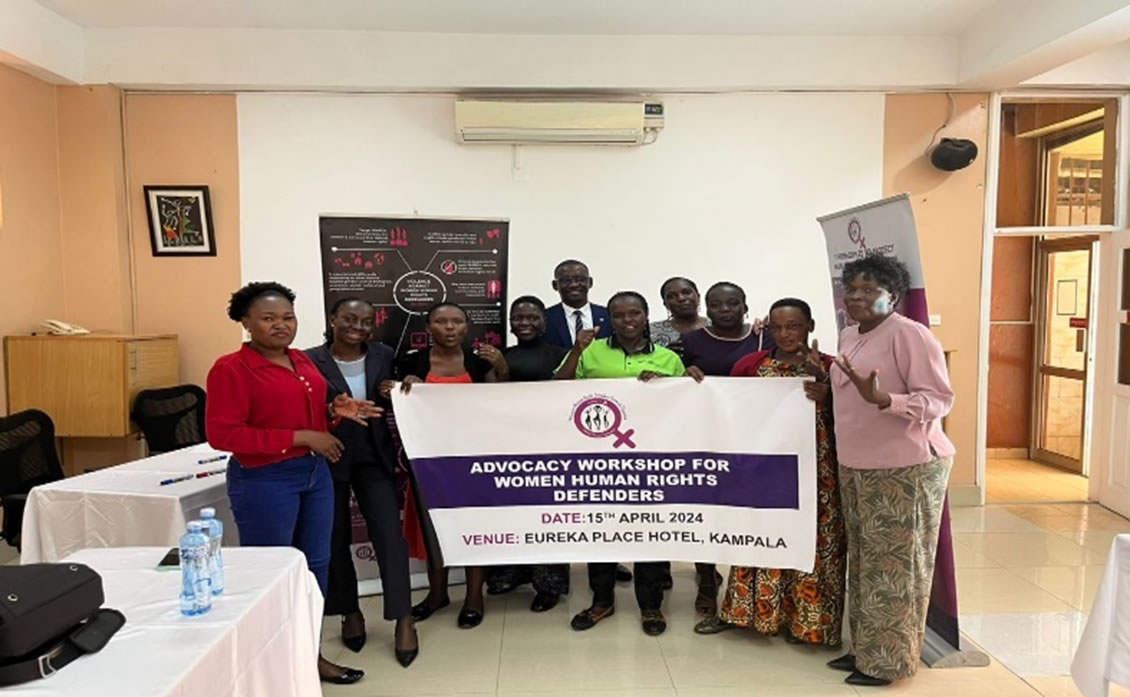Strengthening the Voice of Women Human Rights Defenders
On 15th April 2024, a significant milestone was achieved as the Women Human Rights Defenders Network Uganda (WHRDN-U) convened a one-day advocacy workshop at Eureka Place Hotel, Kampala. This transformative event brought together nine dedicated Women Human Rights Defenders (WHRDs) with the primary goal of enhancing their engagement with Uganda’s Equal Opportunities Commission (EOC).
A Strategic Move toward Rights and Equity
The workshop’s purpose was clear — to empower WHRDs with the skills and knowledge required to influence policymakers and foster a deeper understanding of the EOC’s role in promoting equality for marginalized groups, including WHRDs. Facilitated by the Acting Commissioner of Legal Services and Investigations from the EOC, the workshop was a comprehensive exercise in building capacity and forging stronger alliances for social justice.
Workshop Highlights
- Demystifying the Role of the EOC
– Mandate and Legal Framework: Participants learned about the EOC’s constitutional mandate to eliminate discrimination and inequality. The Commission’s operations are grounded in the Equal Opportunities Commission Act of 2007.
– Functions of the EOC: The EOC investigates cases of discrimination, issues recommendations, and promotes inclusivity. One landmark success was the inclusion of the marginalized Banyabindi community in the Kasese District Service Commission.
– Landmark Legal Ruling: The facilitator highlighted a pivotal Constitutional Court ruling that allows the EOC to investigate cases involving key populations, reinforcing Uganda’s commitment to human rights for all. - Building Advocacy Skills
– Developing Advocacy Materials: Participants gained practical skills in creating advocacy materials, including collective statements and talking points. Exercises focused on stakeholder mapping and evidence-based documentation.
– Role Play: WHRDs engaged in role-play sessions where they presented advocacy briefs and testimonies before a mock EOC, building their confidence to engage with key stakeholders. - Testimonies of Courage and Resilience
– Advocating for Marginalized Communities: One WHRD shared her advocacy journey, highlighting the threats she faced while advocating for the land rights of a marginalized community.
– Fighting Environmental Injustice: Another WHRD shared her experience documenting environmental degradation linked to oil production, recounting the harassment and intimidation she endured as a journalist. - Interactive Q&A with the EOC
– Collaboration Opportunities: Participants explored potential partnerships with the EOC, which pledged support through training and resource provision.
– Regional Engagements: WHRDs raised concerns about the EOC’s limited regional presence. The EOC committed to using mobile clinics and Community Development Officers (CDOs) for outreach.
– Independence of EOC: The facilitator affirmed the EOC’s independence, while noting its reporting obligation to the Ministry of Gender, Labour, and Social Development.

Key Achievements of the Workshop
- Enhanced Knowledge of EOC’s Role: Participants left with a clearer understanding of the EOC’s services, mandate, and the pathways for collaboration.
- Strengthened Advocacy Skills: Through practical exercises, WHRDs improved their ability to create advocacy materials and engage with key stakeholders.
- Strategic Partnerships: Stronger ties were established between WHRDN-U and the EOC, ensuring ongoing capacity-building and advocacy support.

Challenges Identified
- Limited Regional Reach: EOC’s limited presence outside Kampala restricts WHRDs’ access to its services.
- Support for Key Populations: While the EOC investigates discrimination cases, Uganda’s socio-legal environment poses challenges for advocacy on behalf of key populations.
- Narrow Mandate: The EOC’s scope is limited to discrimination cases, excluding broader human rights issues.
The Way Forward
- Education & Awareness: WHRDN-U will collaborate with the EOC to increase awareness of its role, particularly among grassroots WHRDs.
- Strategic Advocacy: WHRDN-U will continue engaging with the EOC to enhance protection mechanisms for WHRDs.
- Regional Outreach: WHRDN-U will support the EOC’s use of mobile clinics and CDOs to reach marginalized groups in remote areas.
Empowering Women to Drive Change
This advocacy workshop was a landmark event in equipping WHRDs with the tools to amplify their voices. By fostering strategic partnerships and building advocacy skills, WHRDs are now better positioned to engage with Uganda’s EOC and challenge discrimination. This initiative reaffirms WHRDN-U’s commitment to protecting and promoting the rights of women human rights defenders and marginalized groups across Uganda.
Article published by Brenda Kugonza, Executive Director of WHRDN-U
